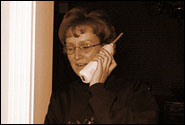Hoping and Waiting
WITH THE RETRIEVAL DONE, embryologist Lisa Stumpo mixed Patti's eggs in a lab dish with Alex's sperm. Three days later, Freedman transferred four fertilized embryos back to Patty's uterus. Then the couple waited. Fourteen days later, Patti took a pregnancy blood test. She lingered at home for the call from doctor Freedman. "Yes? It's positive," she said into the phone. "What are the numbers?"
Freedman told her that the blood test suggested that she might be pregnant with twins - again. "Oh my God," Patti said in a voice both pleased and daunted.
 |
Patti talks to Doctor Freedman about the pregnancy test results.
|
Patti hung up and dialed Alex's cell phone. He was stuck in traffic on the way back from picking up lunch for the boys at McDonald's. Patti gave him the news, and then teased him about the prospect of twins. "Don't feel too much earnings pressure, Bubby," she said.
False alarm. A later ultrasound showed just one fetus. Nearly six months later, all is well with Patti's pregnancy. The baby is due in October.
"It still amazes me that this is how we make children," Patti said about IVF. "We've never gotten pregnant any other way and both times it's worked for us."
In the two decades since the birth of the world's first in vitro baby, the procedure is both widely used and still relatively unreliable - the odds are roughly three-to-one that an IVF procedure will fail. They numbers are especially discouraging for couples who struggle to afford the procedure, mortgaging houses and borrowing money to pay the out-of-pocket costs. Infertility doctors hope that someday, reproductive medicine will be advanced enough that virtually no couple who wants to have kids - and can afford treatment - will have to endure a life of infertility.
Perhaps, if procedures like in vitro fertilization get better and more widely available, science will eventually redefine infertility so the term will only apply to people who are childless after all high-tech options have failed.
Twenty Years of Test-Tube Babies home
|